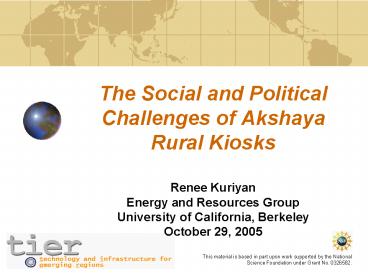The Social and Political Challenges of Akshaya Rural Kiosks - PowerPoint PPT Presentation
1 / 23
Title:
The Social and Political Challenges of Akshaya Rural Kiosks
Description:
The Social and Political Challenges of Akshaya Rural Kiosks Renee Kuriyan Energy and Resources Group University of California, Berkeley October 29, 2005 – PowerPoint PPT presentation
Number of Views:134
Avg rating:3.0/5.0
Title: The Social and Political Challenges of Akshaya Rural Kiosks
1
The Social and Political Challenges of Akshaya
Rural Kiosks
- Renee KuriyanEnergy and Resources
GroupUniversity of California, BerkeleyOctober
29, 2005
2
Overview
- Study Area
- Introduction to Akshaya
- Research methods
- Challenges for Kiosks
- State
- Entrepreneurs
- Conclusions
3
Study Area Kerala
4
Study Area Kerala
- Kerala Model of development
- Sustainability problems
- Two alliances
- UDF LDF/ Communist Party of India (Marxist)
5
Study Area Malappuram District of Kerala
6
Malappuram District Facts
- Area of 3550 km2
- Population 3.64 million people
- 60 of population
- Muslim
- Highest number of
- people living abroad in
- Kerala
7
Akshaya Project Background
- Grassroots beginning
- Shared access model- telecenters
- Public-private partnership
- Goals
- Bridge digital divide
- Provide e-governance
- services
- Universal access
8
Akshaya Project Background
- Initially 630 centers
- Serve 1000 households each
- Now- 435 centers
- E-literacy phase
- 65 women
- Roll out of project
9
State Strategy
- Dual Strategy
- Social Development
- Financial Sustainability
- States aims
- Provide access
- Provide information in local language
- Awareness of IT for citizens
10
State Strategy
- States role
- E-literacy, training, establish connectivity
- Infrastructure
- Entrepreneurs role
- Awareness, business strategy, provide services
and applications
11
Research Methods
- Ethnographic approach
- Interviews
- Households
- Entrepreneurs
- Panchayat members
- Akshaya project staff
- 3 centers
12
Challenges for State
- Balance the pressures of the dual goals
- Redistributive pressures from CPM and classed
based interests for the masses - Pressures from Keralas financial
sustainability crisis - Politics of Muslim league and CPM
Many contradictions associated with dual goals
13
Challenges for State
- Other rural kiosk projects in India (link
financial sustainability with project success) - financial sustainability, business plans, and
business principles
14
Challenges for State
- Implement ICT kiosks as development project
- IT dissemination to the masses
- Recruit entrepreneurs
- Business driven aspects expectations of
government - Risk of political criticism (excluding masses)
Branding as Development Project and Achieving
Business Goals Are Difficult
15
Challenges for Entrepreneurs
- 2 Populations
- Need Development assistance
- Can contribute to making the rural kiosks
profitable
16
Challenges for Entrepreneurs
- Akshaya name vs.
- private sector
- Images associated
- with poor
Branding for both populations is the challenge
17
Conclusions
- Even in a place like Kerala with strong
redistributive principles - Tendency for the state to adopt an ICT strategy
that promotes private sector participation and
sustainability of kiosks
18
Conclusions
- Substantial government support
- Difficult to make rural telecenters both
financially sustainable and also socially
oriented
19
Conclusions
- Akshaya project straddles both goals, yet is not
fully achieving either in its implementation
Financial Sustainability
Social Development Goals
20
Challenges to Consider
- Integration of dual goals and provision of more
relevant applications - Public private partnership-shift in history of
development in Kerala - Transition is slow
21
Positive Note
Widespread awareness of ICTs and basic training
in the Malappuram District
22
(No Transcript)
23
Thank You
- Advisors Isha Ray and Dan Kammen
- Eric Brewer
- Kentaro Toyama and Microsoft Research India
- Akshaya project officials, entrepreneurs and
people of Malappuram District - Tier Group






























